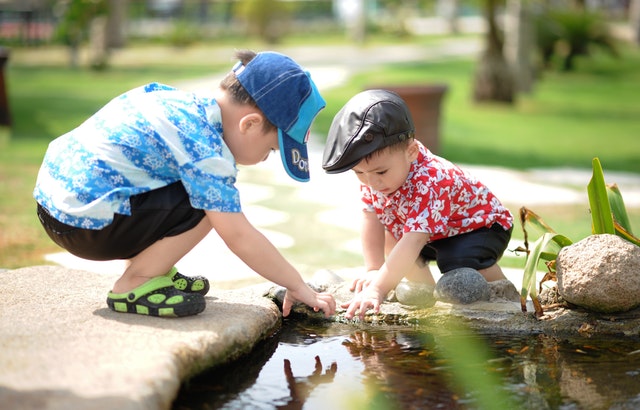Q. My daughter is 8 years old. She is quiet, honest, kind, diligent, and the “dream child to teach”, the teachers say. She follows every rule to the T. On the playground, one of her better friends is starting to bully her. She was crying as she was telling me about the girl telling her to go into a dark shed on the playground. My daughter said she didn’t want to as she was afraid of the dark. The girl teased her for being a cry baby and insisted. Last week this girl told her she couldn’t play with their group and pushed her tray away. My daughter is afraid if she leaves the group she will have no one to play with. What should I do? I encouraged her to say STOP! and that you don’t like the way she is treating you, but she says that is not kind and she doesn’t want to be like this girl. She ‘practiced’ saying it but sounded like a mouse. Do I speak to the girl’s parents? Embarrassing. Or directly to the girl? Appropriate?

A. Your work is with your daughter to help her find her voice without prompting her to use your voice. “Stop” doesn’t work for her but something else will. Of course, we think we would know how to handle the situation if we were in it, and we want to tell our children what to do to solve it. Sometimes our suggestions work. But much of the time we are not helpful because we are simply telling them what we would do.
Your child is a different person from you. Your daughter has a different personality and demeanor. She’s a rule-follower and likes harmony. That’s why she sounded like a mouse. She dislikes and perhaps fears confrontation, whereas another child goes head-first into the fray. She has to find her way. Talking to the other girl or her parents would be awkward of course, but at this stage of the game, it would also be trying to fix the problem and robbing your child of a powerful learning opportunity.
Try a role play:
First, play it out in fantasy. You play the “bully” and act out what your daughter relayed to you. Tell your daughter she can say to you whatever she wants. No one is there to judge her or think badly of her. She has your total permission to yell, scream, say whatever she wants to you/the bully. This may still be tough for her but encourage her by reminding her that this is only between the two of you. She does not have to say any of this. Hopefully she can dig deep and let off some steam.

Then, acknowledge her feelings —“Boy I can see how upset you feel. I sure don’t blame you for feeling that way.” Or if she is hesitant, “I know you felt really upset but your words so far don’t tell me that. Come on and really give it to me. Tell me how mad you are.” Be sure and let her know that this is not what is actually going to happen. It’s just pretend.
Then, once her feelings are expressed, ask her what she could say to the girl for real. Ask, “How did you feel?” “What do you want her to know?” “How can you tell her that?” “What do you think she would think, feel or say if you said that to her?” Keep going as long as she will until she comes up with a good statement that gets her point across without blame. Something like, “I don’t like to be told to do what I don’t want to do.” But you must guide her to find her own words.
Ask her if she’d like to brainstorm with you to find a word or a phrase that she can have at the ready to either say to this girl or say to herself. The rest is her choice whether she says all or none of it. Point out that it is her choice whether or not to do what the bully orders her to do or not. It will help her to know that she always has a choice, so she gets it that she is never anyone’s victim.
The beauty of role play is that it is empowering for a child to know she has it in her to say what she wants even though she may never say it. The role play allows her to come up with the feelings and the words to express them. The job is already done. If she actually talks to or confronts the bully, it’s only frosting on the cake. As I said, some kids can do it easily (all too easily sometimes) and some cannot—yet. But the role play allows her to do it in a safe, supportive way. It also shows her that you will always listen and be there to talk to, to support her, and not to just tell her what to do.

Also be sure and ask her who her “helpers” are. Who can she go to for help if she needs it? Who will always be understanding? Who will listen and not brush her off?
If the bullying continues, the time may come to take action. But do not ever take action without the consent of your daughter. For instance, you might say, “I think it’s time for me to talk to your teacher about this so she is aware and can be helpful.” If your daughter insists that you not do that, take her seriously, ask her what she is afraid of, and what she thinks the next step should be. If you think you need to take action even if she doesn’t want you to, you can say, “I’m going to talk to your teacher about this because I think it’s too much for you right now. Is there something specific you want me to say and that you don’t want me to say?” Always include her, let her know what you are doing and honor her wishes. Nothing makes children madder or more humiliated than going against them in the name of helping them.
Also be careful to acknowledge the difference between teasing and bullying. Bullying is a huge trigger for all of us today. It is a terrible thing and can be damaging for life if not addressed. But not all of what we call bullying is actually that. Children tease each other. It’s been done since the beginning of time. Teasing most especially can and should be handled by the child. Role playing can be a huge help. Always take your child’s feelings seriously and acknowledge how it must feel to be them. Help them find the words to use and do not be tempted to fix this problem for them. By doing that, you grow their dependency on you and then someone else to solve their problems.
Some related topics:







